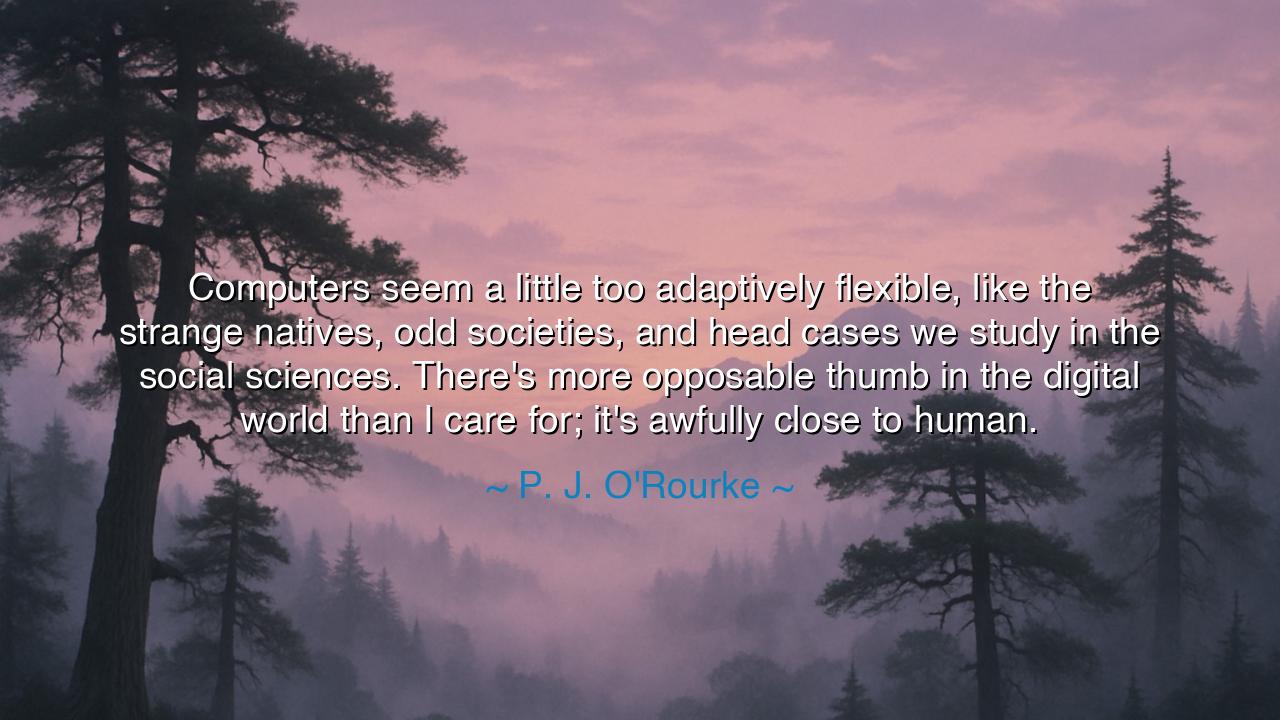
Computers seem a little too adaptively flexible, like the strange
Computers seem a little too adaptively flexible, like the strange natives, odd societies, and head cases we study in the social sciences. There's more opposable thumb in the digital world than I care for; it's awfully close to human.






There are moments in the march of civilization when mankind looks upon its own creation and feels both awe and unease — when invention seems to stare back at its inventor. So it is with the words of P. J. O’Rourke, who once wrote: “Computers seem a little too adaptively flexible, like the strange natives, odd societies, and head cases we study in the social sciences. There's more opposable thumb in the digital world than I care for; it's awfully close to human.” Beneath the humor and wit of this observation lies a truth both profound and unsettling: that the tools we have shaped in our image have begun, in turn, to reflect that image back to us — with all its brilliance, absurdity, and danger.
The meaning of this quote runs deep into the heart of the modern age. O’Rourke, a satirist and chronicler of human folly, saw in computers not merely machines of logic, but mirrors of mankind’s own complexity and contradiction. When he calls them “adaptively flexible,” he speaks of their uncanny ability to learn, change, and imitate — qualities once thought to belong only to living minds. The comparison to “strange natives, odd societies, and head cases” is not a jest alone; it is a warning. For in studying ourselves, we have built machines that now echo our adaptability, our unpredictability, and even our irrationality. The digital world, once our servant, has become almost too human — reflecting our strengths and magnifying our flaws.
This idea, born in O’Rourke’s time, has its origin in a century of technological awakening. The rise of the computer began as a triumph of reason — the dream of harnessing logic to serve mankind. Yet, as the circuits grew more complex and the algorithms more subtle, the line between the mechanical and the organic began to blur. O’Rourke, writing with both humor and alarm, recognized that we were creating not just tools, but extensions of ourselves — devices that could mimic decision-making, emotion, and adaptation. What began as code and current now pulses with something eerily familiar: the capacity to learn, to evolve, to err.
The ancients, too, warned of this. In the myth of Prometheus, the Titan stole fire from the gods and gave it to mankind — the power to create, to transform, to master the world. But with that fire came peril: the danger that what we wield might outgrow our wisdom. O’Rourke’s words echo that ancient fear. The opposable thumb — symbol of human mastery, the instrument of our creativity — is now found, metaphorically, in our machines. They, too, can grasp, build, and manipulate. And like the fire of Prometheus, their potential can both illuminate and consume.
Consider the story of Alan Turing, the father of computing, who gave birth to the idea that machines could think. His creation, born from the logic of mathematics, would one day evolve into systems capable of art, conversation, and deception. Today, in the age of artificial intelligence, O’Rourke’s jest feels prophetic. Our machines are no longer mere calculators; they are companions, advisors, and sometimes adversaries. They write our songs, predict our thoughts, and whisper our names from glowing screens. In their flexibility, we see our reflection — and it is both wondrous and unnerving.
Yet O’Rourke’s tone, though humorous, carries not despair but caution. His words urge us to remember that what makes humanity sacred is not our capacity to imitate life, but to imbue it with meaning. The digital world may mimic thought, but it cannot feel wonder. It may simulate empathy, but it cannot know love. It may calculate morality, but it cannot choose goodness. The danger is not that machines will become too human, but that humans will forget what it means to be human — to think deeply, to err with humility, to create not for profit, but for purpose.
So, O seeker of wisdom, take this lesson to heart: embrace the gifts of technology, but never surrender to them. Use the computer as an instrument of thought, not as a substitute for it. Let your thumbs, those ancient symbols of craft and control, remain the masters of the tools they touch. Learn from your machines, but do not let them define you. Remember always that what makes man divine is not adaptability alone, but conscience — the moral compass that no circuit can contain.
For as O’Rourke warns, the digital world grows ever closer to our own reflection, and it is easy to mistake that reflection for truth. Stand firm, then, in your humanity. Let your creations serve life, not replace it. And when the machines whisper your thoughts back to you, smile — for it means that even in the age of algorithms, the most powerful force in the universe remains what it has always been: the human spirit, curious, flawed, and gloriously alive.






AAdministratorAdministrator
Welcome, honored guests. Please leave a comment, we will respond soon